However, by some lucky chance, some Socratic daemon whispering, may be, in his ear, he picked up the little dingy volume of the last century. It was of a Paris edition, 1751, but what was the name on the fly-leaf. M. de Latour read a J. J. Rousseau. There was no mistake about it, the good bibliophile knew Rousseau's handwriting perfectly well; to make still more sure he paid his seventy-five centimes for the book, and walked across the Pont des Arts, to his bookbinder's, where he had a copy of Rousseau's works, with a facsimile of his handwriting. As he walked, M. de Latour read in his book, and found notes of Rousseau's on the margin. The facsimile proved that the inscription was genuine. The happy de Latour now made for the public office in which he was a functionary, and rushed into the bureau of his friend the Marquis de V. The Marquis, a man of great strength of character, recognised the signature of Rousseau with but little display of emotion. M. de Latour now noticed some withered flowers among the sacred pages; but it was reserved for a friend to discover in the faded petals Rousseau's favourite flower, the periwinkle. Like a true Frenchman, like Rousseau himself in his younger days, M. de Latour had not recognised the periwinkle when he saw it. That night, so excited was M. de Latour, he never closed an eye! What puzzled him was that he could not remember, in all Rousseau's works, a single allusion to the "Imitatio Christi." Time went on, the old book was not rebound, but kept piously in a case of Russia leather. M. de Latour did not suppose that "dans ce bas monde it fut permis aux joies du bibliophile d'aller encore plus loin." He imagined that the delights of the ******* could only go further, in heaven. It chanced, however, one day that he was turning over the "Oeuvres Inedites" of Rousseau, when he found a letter, in which Jean Jacques, writing in 1763, asked Motiers-Travers to send him the "Imitatio Christi." Now the date 1764 is memorable, in Rousseau's "Confessions," for a burst of sentiment over a periwinkle, the first he had noticed particularly since his residence at Les Charmettes, where the flower had been remarked by Madame de Warens. Thus M.
Tenant de Latour had recovered the very identical periwinkle, which caused the tear of sensibility to moisten the fine eyes of Jean Jacques Rousseau.
We cannot all be adorers of Rousseau. But M. de Latour was an enthusiast, and this little anecdote of his explains the sentimental side of the bibliophile's pursuit. Yes, it is SENTIMENT that makes us feel a lively affection for the books that seem to connect us with great poets and students long ago dead. Their hands grasp ours across the ages. I never see the first edition of Homer, that monument of typography and of enthusiasm for letters, printed at Florence (1488) at the expense of young Bernardo and Nerio Nerli, and of their friend Giovanni Acciajuoli, but I feel moved to cry with Heyne, "salvete juvenes, nobiles et generosi; [Greek text]."Such is our apology for book-collecting. But the best defence of the taste would be a list of the names of great collectors, a "vision of mighty book-hunters." Let us say nothing of Seth and Noah, for their reputation as amateurs is only based on the authority of the tract De Bibliothecis Antediluvianis. The library of Assurbanipal I pass over, for its volumes were made, as Pliny says, of coctiles laterculi, of baked tiles, which have been deciphered by the late Mr. George Smith. Philosophers as well as immemorial kings, Pharaohs and Ptolemys, are on our side. It was objected to Plato, by persons answering to the cheap scribblers of to-day, that he, though a sage, gave a hundred minae (360 pounds)for three treatises of Philolaus, while Aristotle paid nearly thrice the sum for a few books that had been in the library of Speusippus.
Did not a Latin philosopher go great lengths in a laudable anxiety to purchase an Odyssey "as old as Homer," and what would not Cicero, that great collector, have given for the Ascraean editio princeps of Hesiod, scratched on mouldy old plates of lead? Perhaps Dr.
Schliemann may find an original edition of the "Iliad" at Orchomenos; but of all early copies none seems so attractive as that engraved on the leaden plates which Pausanias saw at Ascra. Then, in modern times, what "great allies" has the collector, what brethren in book-hunting? The names are like the catalogue with which Villon fills his "Ballade des Seigneurs du Temps Jadis." Acollector was "le preux Charlemaigne" and our English Alfred. The Kings of Hungary, as Mathias Corvinus; the Kings of France, and their queens, and their mistresses, and their lords, were all amateurs. So was our Henry VIII., and James I., who "wished he could be chained to a shelf in the Bodleian." The middle age gives us Richard de Bury, among ecclesiastics, and the Renaissance boasts Sir Thomas More, with that "pretty fardle of books, in the small type of Aldus," which he carried for a freight to the people of Utopia. Men of the world, like Bussy Rabutin, queens like our Elizabeth; popes like Innocent X.; financiers like Colbert (who made the Grand Turk send him Levant morocco for bindings); men of letters like Scott and Southey, Janin and Nodier, and Paul Lacroix; warriors like Junot and Prince Eugene; these are only leaders of companies in the great army of lovers of books, in which it is honourable enough to be a private soldier.

